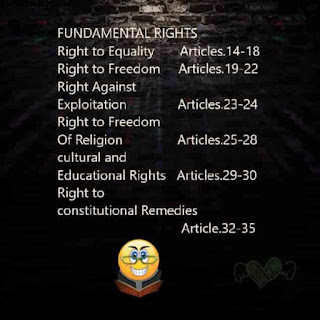 |
| FUNDAMENTAL RIGHTS |
Origin of fundamental rights:
Fundamental rights is listed in the part III of the constitution. Part III of the constitution is known as the MAGNA CARTA of India.In the year 1215, English people got assurance from the king John for respect of the ancient liberties.the assurance was given by the king John,as magna carta. It is the first written document relating to the fundamental rights of the citizen. In 1689 the bill of rights was written to merge all important rights and liberties of the English people. In France they have declared an act ,"declaration of rights of man and citizen 1789."this declaration is related to natural, inalienable and sacred rights of man. By following the Magna Carta of British and the declaration of rights of man and citizen of France, the Americans incorporated the bill of rights in their constitution. The Americans where the first to give bill of rights in a constitutional status.thus, when constitution of India was framed the bill of rights was already incorporated. The framers of the constitution took inspiration from this and incorporated a full chapter in the constitution dealing with fundamental rights. But in our Indian constitution the fundamental right was given most elaborately and complete.
INCLUSION OF FUNDAMENTAL RIGHTS IN CONSTITUTION OF INDIA
The aim of having a fundamental rights in the Indian constitution is to have certain elementary rights, such as, right to life, right to Liberty, right to freedom of speech, freedom of faith, and so on.
In west virginia State board of education v Barnet.
The nature and purpose of the bill of right was observed:
The purpose of Bill of right was through with certain subject from the transformation of political controversy, to place them beyond the reach of majority and officials and to establish them us legal principles to be applied by the court. One's right to life, liberty and property, to free speech, a free press, freedom of worship and assembly and other fundamental rights may not be submitted to vote, it will give the outcome of no election.
Why fundamental right is needed?
The essential need of fundamental right is to protect the rights and liberties of the people against the the power delegated by the government. There are limitation upon all the powers of the government , legislative as well as executive and their essential for the preservation of public and private rights, notwithstanding the representative character of political instrument.
In Maneka Gandhi v union of India, it is observed that these fundamental rights represent the basic values cherished by the people of this country (India) since the vedic times and they are calculated to protect the dignity of the individual and create conditions in which every human being can develop his personality to the fullest extent. in the way pattern of guarantee on the basic structure of human rights., And impose negative obligation on the state not to encroach on individual Liberty in its various dimension. The object behind the inclusion of fundamental rights in Indian constitution is to establish a government of law and not of man ,in an election majority wins, and governs the the government of a state , by this process a winning government system does not suppress the minority. The objectives to establish rule of law and it could not be wrong to say that the Indian constitution in this respect goes much ahead than any other constitution of the world. The object of the fundamental right is not nearly to provide security and equity citizenship of the people living in this land and thereby helping the process of nation building, citizenship, justice and fair play.
Classification of fundamental rights:
The fundamental rights which is given in the Indian constitution can be classified by six groups:
1) right to equality (articles 14 to 18)
2) right to freedom (articles 19 to 22)
3) right against exploitation (articles 23 to 24)
4) right to freedom of religion (articles 25 to 28)
5) cultural and educational rights (articles 29 to 30)
6) right to constitutional remedies (articles 32 to 35)
The 44th amendment as abolished the right to property as fundamental right as guarantee buy article 19 (1)(f) an article 31 of the constitution,article 19 (1)(f) and article 31 has been omitted.
Fundamental rights available against state and not against private individuals.
According to constitutional the fundamental rights were given to the individual to protect against the state. Fundamental right in constitution are a guarantee against state action as distinct used to form violation of such rights from private parties. In PD Shamdasani v Central Bank of India, the petitioner, said, under article 32 of the constitution, sought the protection of the court on the ground that is property right under article 19 (1)(f) and 31 where are infringed by the action of another private person-Central Bank of India. The supreme court held that petition as, neither article 19(1) nor article 31(1) was intended to prevent wrongful individuals act or to provide protection against nearly private conduct.
Part 3 of the constitution clearly shows that the article was intended to protect those freedom against the state action other than in the legitimate exercise of his power to regulate private rights of property by individual is not within the purview of the articles.


0 Comments